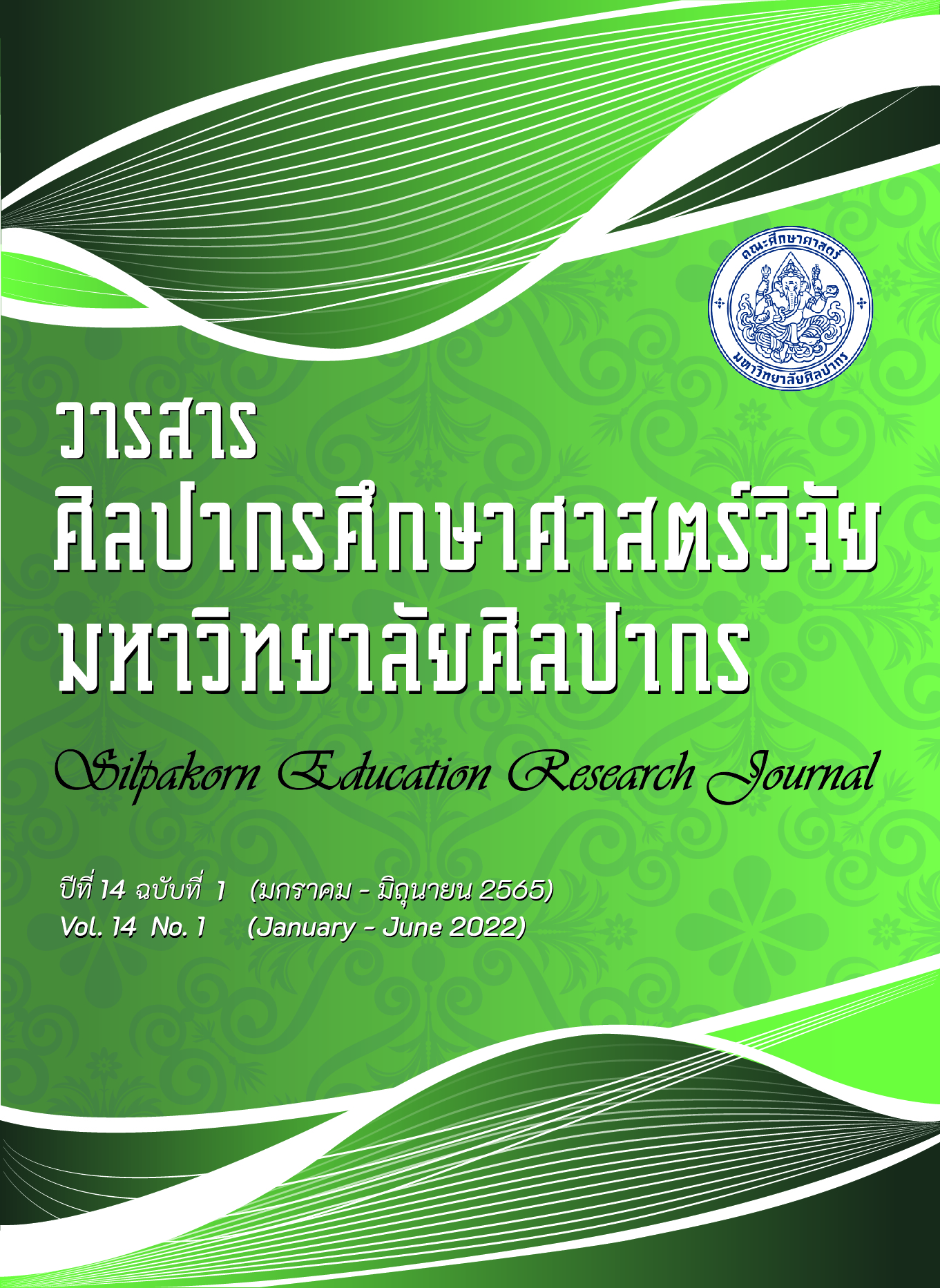การศึกษาผลของการจัดการเรียนรู้เชิงรุกแบบอาคีตะ ในสถานการณ์การแพร่ระบาด ของโรคติดเชื้อไวรัสโคโรนา 2019 ที่มีต่อผลสัมฤทธิ์ทางการเรียน ทักษะการแก้ปัญหาทางคณิตศาสตร์ และความพึงพอใจของนักเรียนชั้นมัธยมศึกษาปีที่ 6 ในการเรียนเรื่องแคลคูลัสเบื้องต้น
คำสำคัญ:
การจัดการเรียนรู้เชิงรุกแบบอาคีตะ, ผลสัมฤทธิ์ทางการเรียนเรื่องแคลคูลัสเบื้องต้น, ทักษะการแก้ปัญหาทางคณิตศาสตร์เรื่องแคลคูลัสเบื้องต้นบทคัดย่อ
งานวิจัยนี้จัดทำขึ้นเพื่อศึกษาผลสัมฤทธิ์ทางการเรียน ทักษะการแก้ปัญหาทางคณิตศาสตร์ และความพึงพอใจของนักเรียนที่มีต่อการจัดการเรียนรู้เรื่องแคลคูลัสเบื้องต้น ของนักเรียนหลังเรียนด้วยวิธีการจัดการเรียนรู้เชิงรุกแบบอาคีตะ ในสถานการณ์การแพร่ระบาดของโรคติดเชื้อไวรัสโคโรนา 2019 ด้วยวิธีการวิจัยเชิงปริมาณ โดยใช้การวิจัยเชิงทดลองกับกลุ่มตัวอย่าง ซึ่งเป็นนักเรียนแผนการเรียนวิทยาศาสตร์–คณิตศาสตร์ ที่ได้มาจากการสุ่มตัวอย่างแบบกลุ่ม จำนวน 39 คน เครื่องมือที่ใช้ในการวิจัยประกอบด้วย 1) แผนการจัดการเรียนรู้วิชาคณิตศาสตร์เสริม 5 ชั้นมัธยมศึกษาปีที่ 6 เรื่องแคลคูลัสเบื้องต้น ที่ใช้การจัดการเรียนรู้เชิงรุกแบบอาคีตะ ในสถานการณ์การแพร่ระบาดของโรคติดเชื้อไวรัสโคโรนา 2019 ในการจัดการเรียนรู้ ซึ่งมีดัชนีประสิทธิผลเท่ากับ 0.7026 2) แบบทดสอบวัดผลสัมฤทธิ์ทางการเรียนเรื่องแคลคูลัสเบื้องต้น ที่มีค่าความเชื่อมั่นเท่ากับ 0.86 3) แบบทดสอบวัดทักษะการแก้ปัญหาทางคณิตศาสตร์เรื่องแคลคูลัสเบื้องต้น ที่มีค่าความเชื่อมั่นเท่ากับ 0.88 4) แบบวัดความพึงพอใจของนักเรียนที่มีต่อการจัดการเรียนรู้เรื่องแคลคูลัสเบื้องต้น ที่มีค่าความเชื่อมั่นเท่ากับ 0.84 ผลการวิจัยพบว่านักเรียนที่ได้รับการจัดการเรียนรู้ด้วยการจัดการเรียนรู้เชิงรุกแบบอาคีตะ ในสถานการณ์การแพร่ระบาดของโรคติดเชื้อไวรัสโคโรนา 2019 1) มีผลสัมฤทธิ์ทางการเรียนหลังเรียนเรื่องแคลคูลัสเบื้องต้นสูงกว่าก่อนเรียน 2) มีคะแนนพัฒนาการสัมพัทธ์ผลสัมฤทธิ์ทางการเรียนเรื่องแคลคูลัสเบื้องต้นสูงกว่าเกณฑ์ที่กำหนด คือ 50 คะแนน 3) มีทักษะการแก้ปัญหาทางคณิตศาสตร์เรื่องแคลคูลัสเบื้องต้น ในการหาคำตอบของปัญหาทุกข้อ ตั้งแต่ระดับโครงสร้างหลากหลายขึ้นไป คิดเป็นจำนวนมากกว่าร้อยละ 60 และ 4) มีความพึงพอใจต่อการจัดการเรียนรู้เรื่องแคลคูลัสเบื้องต้นในระดับ มากที่สุด อย่างมีนัยสำคัญทางสถิติที่ระดับ .05 ดังนั้นวิธีจัดการเรียนรู้เชิงรุกแบบอาคีตะ จึงเป็นวิธีการจัดการเรียนรู้ที่สามารถนำมาใช้ ในสถานการณ์การแพร่ระบาดของโรคติดเชื้อไวรัสโคโรนา 2019 ได้อย่างมีประสิทธิผล
เอกสารอ้างอิง
International Infectious Disease Group. (2021). Coronavirus disease 2019 situation public health measures and problems in preventing and controlling diseases in travelers. [Online]. Retrieve March 20, 2021, from https://ddc.moph.go.th
Kenan Foundation Asia. (2020). The Impact of COVID-19 on Education. [Online]. Retrieve October 15, 2020, from https://www.kenan-asia.org/th/covid-19-education-impact/
Pakdeewirot, Cherdsak. (2013). The Effects of Organizing Active Learning in Mathematical Process Skills on Mathematical Problem Solving Ability, Critical Thinking Ability and Self–Confidence of Mathayomsuksa III Students. Master’s of Secondary Education Graduate School Srinakharinwirot University. (in Thai)
Pimbuspa, Supaporn. (2019). Development of Learning activities on Linear Variable Equations for Mathayomsuksa I by Applying the Akita’s Active Learning Management. Master’s of Mathematics Education Graduate School Ramkhamhaeng University. (in Thai)
Prasomsart, Nareerat. (2019). “The Effects of Mathematics Learning Management on Active Learning with Think-Pair-Share Technique Toward Mathematical Problem Solving Ability and Learning Achievement for Mathayomsuksa III Students”. MBU Education Journal 7(2): 495–508.
Sunthornwibul, Patcharaporn. (2018). The Concept of Creating Measurement Form with Digital Technology. Journal of Educational Measurement 35(97): 10–21.
Teaching and Evaluation Support Group. (2005). Measurement and Evaluation Based on Learning Standards According to Mathematics’s Basic Education Curriculum 2001. Bangkok: Office of Academic Affairs and Educational Standards.
Wei Bao. (2020). “COVID-19 and online teaching in higher education: A case study of Peking University”. Human Behavior and Emerging Technologies 2(2): 113–115.
Wilson, James W. (1971). Evaluation of Learning in Secondary School Mathematics in Handbook on Formative and Summative Evaluation of Student Learning. U.S.A: McGraw–Hill.
Wongsakuldee, Sirima. (2015). “The effects of Active Learning Activities on Mathematical Problem Solving and Reasoning Ability in Atatistics of Mathayomsuksa III Students”. Veridian E–Journal Silapakorn University (Humanities, Social Sciences and arts) 8(2): 1265–1281.





